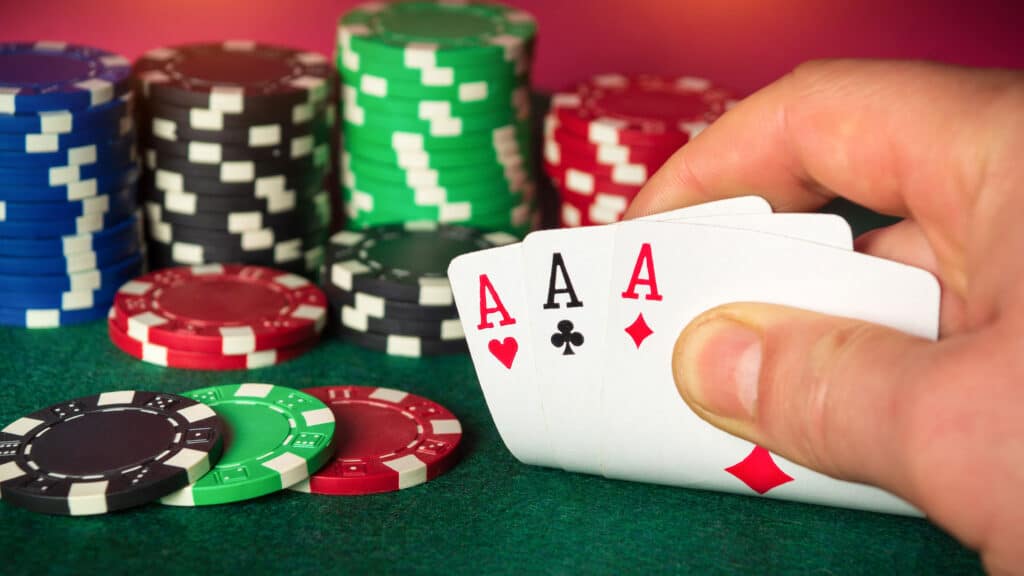To consistently win in the high-stakes world of poker, mastering the cards is only half the battle; understanding and leveraging psychological strategies in poker success is equally crucial, turning a game of chance into a calculated contest of minds.
The Mental Fortress: Emotional Control in Poker
Emotional control, often dubbed the ‘mental fortress’ in poker, is the bedrock of psychological strategy. It’s about maintaining composure under pressure, resisting impulsive reactions, and making rational decisions regardless of the stakes or recent outcomes. In poker, emotions are liabilities; they cloud judgment, lead to predictable plays, and can be ruthlessly exploited by astute opponents. Mastering emotional control is not just about avoiding ‘tilt’; it's about cultivating a state of mind where decisions are driven by logic and strategy, not by fear, frustration, or euphoria.
Tilt Management: Recognizing and Counteracting Emotional Leaks
Tilt is a state of emotional disarray in poker, often triggered by a series of bad beats or significant losses, leading to irrational and often aggressive play. Recognizing the onset of tilt is the first step to managing it. Symptoms include increased impulsivity, deviation from established strategies, heightened frustration, and a compulsion to ‘win back’ losses immediately. Counteracting tilt involves employing strategies such as taking breaks, practicing mindfulness, and pre-game mental preparation to reinforce emotional resilience. For instance, a player who consistently practices meditation might find it easier to regain composure after a tough hand, compared to someone who has not developed such mental tools. Effective tilt management can be the difference between a temporary setback and a catastrophic loss.
Impulse Control: The Discipline of Calculated Decisions
Impulse control in poker is the ability to resist acting on immediate urges, favoring instead well-thought-out, strategic plays. Poker is rife with situations that can trigger impulsive actions – the adrenaline rush of a big bluff, the frustration of a missed draw, or the desire to chase losses. Players with strong impulse control can pause, evaluate the situation objectively, and choose the most strategically sound action, even if it’s less immediately gratifying. This discipline extends from bet sizing to game selection, ensuring every decision aligns with long-term profitability rather than short-term emotional satisfaction. Consider a player facing an all-in bet on the river. An impulsive player might call out of curiosity or ego, while a player with strong impulse control will methodically assess the odds, opponent tendencies, and pot odds before making a calculated decision, even if it means folding a potentially strong hand.
Reading the Opponent: Decoding Nonverbal and Verbal Cues
In poker, opponents are not just adversaries; they are open books waiting to be read. The ability to accurately read opponents, both through nonverbal cues and verbal tells, is a cornerstone of psychological advantage. This skill involves keen observation, pattern recognition, and an understanding of human psychology under pressure. Decoding these cues can provide invaluable insights into the strength of an opponent's hand, their betting intentions, and their overall mental state, allowing for more informed and profitable decisions.
Nonverbal Tells: Observing Body Language and Microexpressions
Nonverbal tells are subtle physical cues that can betray an opponent's hand strength or intentions. These can range from broad body language indicators, such as posture and eye contact, to fleeting microexpressions – involuntary facial expressions that last only fractions of a second. For example, a player who suddenly avoids eye contact after betting big might be signaling nervousness and a potentially weaker hand. Conversely, a relaxed posture and steady gaze could indicate confidence and a strong holding. Learning to observe and interpret these nonverbal signals requires practice and a nuanced understanding of how different individuals manifest stress and confidence. However, it’s crucial to remember that tells are not foolproof and should be considered in conjunction with other information like betting patterns and player history.
Verbal Tells: Listening Beyond the Words
Verbal tells, while less reliable than nonverbal cues due to the possibility of deliberate deception, can still offer clues about an opponent's state of mind and hand strength. These tells are not just about what opponents say, but how they say it – tone of voice, speech patterns, and specific phrases used under pressure. For instance, a player who tries too hard to appear weak by saying “I probably should fold” might actually be bluffing and hoping to induce a call. Conversely, a player who speaks confidently and quickly might be trying to intimidate opponents with a strong hand. Effective use of verbal tells involves listening attentively, noting inconsistencies between words and demeanor, and filtering verbal information through the lens of the game situation and opponent's personality. It's about listening not just to the words themselves, but to the subtle undertones and context that might reveal hidden intentions.
Projecting an Image: Strategic Self-Presentation
Strategic self-presentation in poker is the art of managing the image you project at the table to influence opponents' perceptions and decisions. This involves consciously controlling your own body language, betting patterns, and table talk to create a desired impression – be it of a tight, aggressive, or unpredictable player. The goal is to manipulate opponents into making mistakes based on their assumptions about your playing style and hand strength. Projecting a carefully crafted image is not about deception for its own sake; it's about adding another layer of complexity to your strategy, making your plays harder to read and your bluffs more believable.
Table Image: Cultivating Perceptions of Playing Style
Table image is the overall perception opponents have of your playing style, formed by observing your betting habits, hand selections, and behavior over time. A tight table image, characterized by conservative play and infrequent bluffs, can induce opponents to fold more often when you bet strongly, maximizing value when you have a good hand. Conversely, a loose-aggressive image, marked by frequent betting and bluffing, can make opponents more likely to call your bets, believing you are often bluffing, which can be exploited when you have a genuinely strong hand. Strategically managing your table image involves consciously adjusting your play to cultivate a specific perception, then leveraging that perception to your advantage in key situations. For example, a player might start a session playing very tightly to build a ‘rock’ image, then switch to more aggressive play, capitalizing on opponents' preconceived notions.
Misdirection and Deception: Layering Complexity into Your Game
Misdirection and deception are advanced psychological tactics aimed at misleading opponents about your hand strength or intentions. This goes beyond simple bluffing and involves creating false patterns, mixing up play styles, and using reverse psychology to induce opponents into making incorrect reads. For instance, a player might consistently check-raise with weak hands to create the image of being overly aggressive, then suddenly check-call with a monster hand, inducing opponents to bluff into them. Deception is most effective when it's subtle and unpredictable, making it difficult for opponents to categorize your play and exploit predictable patterns. It's about adding layers of complexity to your game, turning poker into a psychological labyrinth where opponents struggle to decipher your true strategy. However, excessive deception can backfire if it becomes too transparent or if it leads to overly complex and less profitable plays.
Strategic Betting: Psychological Warfare in Bet Sizing
Bet sizing in poker is not just a mathematical calculation; it's a powerful tool for psychological manipulation. The size of your bets can communicate strength or weakness, induce fear or curiosity, and influence opponents' calling or folding decisions. Strategic bet sizing involves understanding how different bet sizes are perceived by opponents, and using this knowledge to extract maximum value from strong hands, or to successfully execute bluffs. It's about using bet sizing as a form of psychological warfare, shaping the narrative of the hand and controlling the flow of action to your advantage.
Value Betting: Maximizing Returns from Strong Hands
Value betting is the practice of betting when you believe you have the best hand, with the primary goal of extracting value from opponents. Psychologically, the size of a value bet can be crucial. A bet that is too small might not extract sufficient value, inviting opponents with weaker hands to call and potentially outdraw you. Conversely, a bet that is too large might scare opponents away, causing them to fold hands they might have called against a smaller bet. Effective value betting involves finding the ‘sweet spot’ – a bet size that is large enough to extract significant value when you are ahead, yet still enticing enough to be called by opponents with worse hands. This often requires adjusting bet sizes based on opponent tendencies, board texture, and the stage of the game. For example, against a passive calling station, larger value bets are often more effective, while against a tighter, more discerning player, smaller, more nuanced bet sizes might be optimal.
Bluffing and Bet Sizing: Inducing Folds with Credible Bets
Bluffing in poker is the art of betting with a weak hand to induce opponents to fold stronger hands. The success of a bluff hinges heavily on bet sizing and psychological credibility. A bluff bet needs to be large enough to be believable and to make folding a more attractive option than calling for opponents holding marginal hands. However, it should not be so large that it appears overly aggressive or desperate, which can make opponents suspicious and more inclined to call. Effective bluff bet sizing often involves considering the pot size, board texture, opponent tendencies, and your table image. For instance, a well-timed bluff on a dry board with a bet size that is a significant portion of the pot can be highly effective, especially against opponents who are risk-averse. The psychological aspect of bluffing is about creating a narrative with your bet size that makes your story – that you have a strong hand – believable and compelling.
Patience and Discipline: Long-Term Psychological Endurance
Patience and discipline are the cornerstones of long-term psychological endurance in poker. Poker is not a sprint; it's a marathon. Success requires the mental fortitude to withstand variance, avoid chasing losses, and consistently adhere to a profitable strategy over extended periods. Patience is about waiting for the right opportunities and avoiding forced plays, while discipline is about sticking to your game plan, even when faced with short-term setbacks or temptations to deviate. These psychological traits are essential for navigating the inevitable ups and downs of poker, ensuring consistent performance and long-term profitability.
Variance Management: Accepting the Inevitable Swings
Variance, the statistical measure of deviation from expected outcomes, is a fundamental aspect of poker. In the short run, variance can lead to significant swings – both winning and losing streaks – that are often beyond a player's control. Psychologically, managing variance involves accepting these inevitable fluctuations as a normal part of the game and avoiding emotional reactions to short-term results. Players who understand and accept variance are less likely to tilt during losing streaks or become overconfident during winning streaks. Effective variance management requires a long-term perspective, focusing on the process of making sound decisions rather than the immediate outcome of each session or hand. For example, a player who tracks their results over thousands of hands is better equipped to understand their true win rate and to see short-term swings in the context of long-term averages, reducing the emotional impact of variance.
Bankroll Management: Playing Within Psychological Comfort Zones
Bankroll management, the practice of managing poker funds responsibly, is deeply intertwined with psychological well-being in poker. Playing with stakes that are too high for one's bankroll can induce stress, fear of ruin, and emotionally driven decisions. Conversely, proper bankroll management ensures that players are playing within their ‘psychological comfort zone’ – stakes where losses are manageable and do not trigger emotional distress. This allows for clearer, more rational decision-making, as players are not playing out of fear. Effective bankroll management involves setting aside a dedicated poker bankroll, adhering to stake levels appropriate for that bankroll, and regularly reassessing bankroll size and stake levels based on results and financial circumstances. For instance, a common guideline is to have at least 20-30 buy-ins for cash games or 50-100 buy-ins for tournaments, depending on risk tolerance and game variance. Playing within comfortable bankroll limits reduces emotional pressure and allows players to focus on making optimal poker decisions, rather than worrying about financial repercussions.
Confidence and Aggression: The Power of a Positive Poker Mindset
Confidence and aggression, when balanced and strategically applied, are potent psychological weapons in poker. Confidence, rooted in preparation and skill, projects an image of competence and control, which can intimidate opponents and make bluffs more believable. Aggression, manifested through proactive betting and raising, puts pressure on opponents, forcing them to make tough decisions and increasing the likelihood of inducing folds or extracting value. However, both confidence and aggression must be tempered with discipline and strategic awareness. Overconfidence can lead to recklessness, while excessive aggression can become predictable and exploitable. The key is to cultivate a positive poker mindset that is both confident and controlled, aggressive yet calculated.
Projecting Confidence: Influencing Opponent Perception
Projecting confidence at the poker table is a subtle but powerful psychological tactic. It's about conveying an aura of competence, control, and certainty in your decisions, regardless of your actual hand strength. This can be achieved through various means – maintaining steady eye contact, displaying relaxed body language, betting decisively, and engaging in confident table talk. Projected confidence can influence opponents in several ways. It can make bluffs more believable, induce opponents to second-guess their reads, and even cause them to play more passively against you, fearing your perceived strength. However, projecting confidence should not be confused with arrogance or aggression. The goal is to subtly influence perception, not to intimidate or antagonize opponents. Effective projection of confidence is often most potent when it's understated and natural, emanating from a genuine sense of preparedness and mental composure.
Strategic Aggression: Applying Pressure and Taking Control
Strategic aggression in poker is about taking the initiative, betting and raising frequently to put pressure on opponents and control the flow of the game. Aggression, when applied selectively and strategically, can be highly effective for several reasons. It forces opponents to make more decisions under pressure, increasing the likelihood of errors. It can win pots outright when opponents fold to your bets. And it can build larger pots when you have a strong hand, maximizing value extraction. However, aggression must be balanced with strategic awareness and hand selection. Blind aggression, without regard to board texture, opponent tendencies, or hand strength, can be easily exploited. Strategic aggression is about choosing the right spots to apply pressure – when you have position, when the board texture favors your perceived range, and against opponents who are risk-averse or passive. It's about using aggression as a tool to dictate the pace of the game, seize control of pots, and psychologically wear down opponents, but always within the framework of a sound and disciplined poker strategy.
Conclusion: The Psychological Edge in Modern Poker
In conclusion, while a solid understanding of poker rules and probabilities is essential, mastering psychological strategies in poker success represents the true edge in modern, competitive poker. Emotional control, opponent reading, strategic self-presentation, psychological bet sizing, long-term mental endurance, and a confident, aggressive mindset are not just supplementary skills; they are integral components of a winning poker strategy. In a game where information is incomplete and decisions are made under pressure, the psychological dimension often outweighs the mathematical. Players who cultivate these mental skills not only improve their win rates but also enhance their overall poker experience, turning each session into a fascinating battle of wits and psychological resilience. As poker continues to evolve, the psychological game will only become more critical, separating those who merely play the cards from those who truly master the minds at the table.



